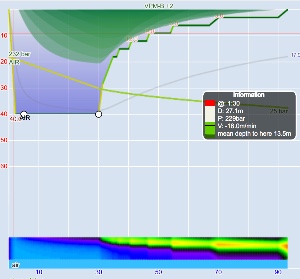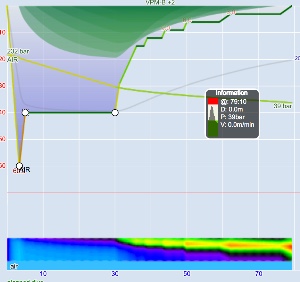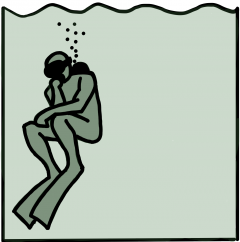In VPM-B you can shorten your deco by doing another dive before. Sounds crazy? But this is what this model predicts as I recently learned from Subsurface user who thought he was reporting a bug. To be concrete, let’s plan an air dive to 40m with 30min bottom time (just for concreteness, maybe this is not the optimal gas choice but let’s keep things simple, the argument does not depend on this). With conservatism +2 we get the following plan
<
Runtime: 93min
|
depth |
duration |
runtime |
gas |
|
| ➘ | 40m | 2min | 2min | air |
| ➙ | 40m | 28min | 30min | |
| – | 18m | 6min | 36min | |
| – | 15m | 4min | 40min | |
| – | 12m | 6min | 46min | |
| – | 9m | 8min | 54min | |
| – | 6m | 13min | 67min | |
| – | 3m | 23min | 90min | |
| ➚ | 0m | 3min | 93min |
But then add a 60m for 30m dive a bit less than two days (this is the limit that Subsurface considers two dives “repetitive diving”) before and you get:
Subsurface dive plan (surface interval 44:00)
Runtime: 78min
|
depth |
duration |
runtime |
gas |
|
| ➘ | 40m | 2min | 2min | air |
| ➙ | 40m | 28min | 30min | |
| – | 15m | 8min | 38min | |
| – | 12m | 5min | 43min | |
| – | 9m | 6min | 49min | |
| – | 6m | 9min | 58min | |
| – | 3m | 17min | 75min | |
| ➚ | 0m | 3min | 78min |
So, you get out of the water 15 minutes earlier! From the point of view of a Bühlmann-type model this sounds totally ridiculous: You would think that the effect of the previous dive is to add inert gas saturation to your tissues and indeed, even for VPM-B that is the case, but the consequences are opposite. The reason is that the previous dive sets the “maximal crushing pressure” and thus the “crushing radius” at the deepest point of the dive. And, as you know from a previous post, this enters the maximal gradient (at least the initial one) that VPM-B will allow you: Translated into gradient factors, without previous dive, Subsurface computes effective GFs as 24/71 versus as a second dive 26/92.
I was even more surprised that in the VPM-B literature this is considered a feature rather than a bug of the model: The previous dive pre-compresses the bubbles and thus they are less dangerous (or something like this). See the very last paragraph of this article.
Actually, to see this behaviour in Subsurface, you cannot use the latest version (or you have to comment out the lines
for (ci = 0; ci < 16; ci++) {
max_n2_crushing_pressure[ci] = 0.0;
max_he_crushing_pressure[ci] = 0.0;
}
in the function clear_vpmb_state() in deco.c as I did) as we decided this is too odd and rather opted for the more conservative option to reset the crushing pressure between dives. But that of course poses the question “What is exactly ‘between dives’?”. Is a short visit to the surface starting a second dive and thus magically resetting the state of bubbles in your body?
And of course the underlying question remains (until somebody does an empirical study): Can you really shorten the deco time by pre-compressing the diver?
It doesn’t even have to be a separate dive. According to VPM-B, I can bounce to 60m and immediately return back to 40m and then I get the benefit of shorter deco (compared to the version of the dive where I stayed at 40m):
Runtime: 79min
|
depth |
duration |
runtime |
gas |
|
| ➘ | 60m | 3min | 3min | air |
| ➚ | 40m | 2min | 5min | |
| ➙ | 40m | 25min | 30min | |
| – | 15m | 8min | 38min | |
| – | 12m | 5min | 43min | |
| – | 9m | 6min | 49min | |
| – | 6m | 10min | 59min | |
| – | 3m | 17min | 76min | |
| ➚ | 0m | 3min | 79min |


